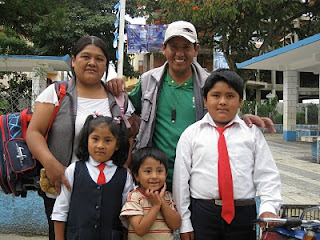In 2009 the College and Carmen Pampa Fund designed a new initiative: English and Ecotourism--Foundations for the Future. The objective of the initiative was to strengthen the College's English Program--with particular focus on the Ecotourism major.
 Jessica Bellock works with a UAC-CP student in the Ecotourism Program.
Jessica Bellock works with a UAC-CP student in the Ecotourism Program.Thanks to funding from Sieben Foundation, Carmen Pampa Fund was able to form a special task force of ESL experts and hire consultant Dr. Susan Bosher, Associate Professor of English and Director of ESL at St. Catherine University, St. Paul. Together, they have worked with faculty and staff at the UAC-CP to develop a comprehensive overhaul of the College's English Program. The inauguration of the new English curriculum was implemented this past February at the beginning of the 2010 academic year. And we're happy to report that after just two months, exciting progress is already being made!
Our work isn't finished though. In order to sustain the initiative and ensure its success, Carmen Pampa Fund is working with its academic partner St. Catherine University to recruit trained professionals who are interested in sharing their time and talents to help strengthen the College's English Program here in Carmen Pampa. Students at St. Catherine University also have the opportunity to do semester-long internships for credit.

Kyle Piispanan, David Flannery, and Ben Yoder-Henley--volunteers for the 2010 academic year. (Not pictured is Sarah Purcell)
But professional opportunities at the College are not just for St. Catherine University students. We welcome committed and hard-working volunteers with experience in teaching English as a Second Language. In the past we have welcomed students from University of Wisconsin-River Falls, Boston College, College of St. Benedict, South Dakota State University, University of Minnesota, etc. We also welcome retired professionals and professionals who are on sabbatical.
For more information about how you can be a part of this exciting new initiative at the UAC-CP, please visit Carmen Pampa Fund's website to review job descriptions.




